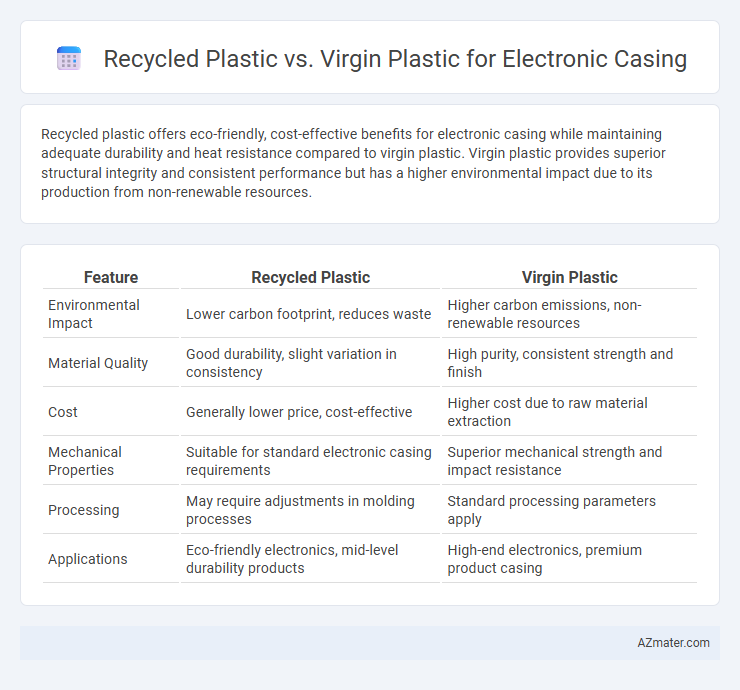Recycled plastic offers eco-friendly, cost-effective benefits for electronic casing while maintaining adequate durability and heat resistance compared to virgin plastic. Virgin plastic provides superior structural integrity and consistent performance but has a higher environmental impact due to its production from non-renewable resources.
Table of Comparison
| Feature | Recycled Plastic | Virgin Plastic |
|---|---|---|
| Environmental Impact | Lower carbon footprint, reduces waste | Higher carbon emissions, non-renewable resources |
| Material Quality | Good durability, slight variation in consistency | High purity, consistent strength and finish |
| Cost | Generally lower price, cost-effective | Higher cost due to raw material extraction |
| Mechanical Properties | Suitable for standard electronic casing requirements | Superior mechanical strength and impact resistance |
| Processing | May require adjustments in molding processes | Standard processing parameters apply |
| Applications | Eco-friendly electronics, mid-level durability products | High-end electronics, premium product casing |
Introduction to Plastic Use in Electronic Casings
Electronic casings rely heavily on plastics like ABS, polycarbonate, and polypropylene for their durability, lightweight properties, and insulating capabilities essential in protecting sensitive components. Recycled plastic in electronic casings offers an eco-friendly alternative by reducing reliance on virgin plastic derived from petrochemicals, thereby lowering carbon footprints and conserving natural resources. The choice between recycled and virgin plastics directly impacts sustainability goals, mechanical performance, and manufacturing costs in electronics production.
Overview: Recycled Plastic vs Virgin Plastic
Recycled plastic in electronic casing offers significant environmental benefits by reducing plastic waste and lowering carbon emissions compared to virgin plastic, which is made from new, petroleum-based materials. While virgin plastic provides consistent quality and mechanical strength ideal for high-performance casings, recycled plastic technology has advanced to deliver comparable durability and heat resistance suitable for many electronic devices. Cost-effectiveness and sustainability drive manufacturers toward increased use of recycled plastics without compromising product safety and longevity.
Environmental Impact: Recycled vs Virgin Plastics
Recycled plastics used in electronic casing significantly reduce environmental impact by minimizing plastic waste and lowering carbon emissions compared to virgin plastics, which require extensive extraction and processing of fossil fuels. The production of virgin plastic generates higher greenhouse gas emissions and contributes to resource depletion, whereas recycled plastic lowers energy consumption by up to 80% during manufacturing. Utilizing recycled plastic promotes a circular economy, reducing landfill accumulation and ocean pollution from discarded electronic casings.
Material Properties and Performance Comparison
Recycled plastic for electronic casing often exhibits slightly reduced mechanical strength and thermal stability compared to virgin plastic due to potential polymer chain degradation during recycling processes. Virgin plastic offers superior impact resistance, higher tensile strength, and consistent electrical insulation properties essential for safeguarding electronic components. Despite minor performance trade-offs, recycled plastics provide adequate durability and thermal resistance for many electronic casing applications while significantly reducing environmental impact and material costs.
Cost Analysis: Production and Long-term Value
Recycled plastic for electronic casing reduces initial production costs by up to 30% due to lower raw material prices and energy consumption in manufacturing processes. Virgin plastic offers higher durability and consistent quality, potentially lowering long-term maintenance and replacement expenses. Evaluating total cost of ownership reveals recycled plastic's economic advantage in short-term projects, while virgin plastic supports enhanced lifecycle value in high-performance electronics.
Regulatory Standards and Compliance
Recycled plastic for electronic casing must meet stringent regulatory standards such as RoHS, REACH, and WEEE directives to ensure safety, environmental compliance, and performance equivalence to virgin plastic. Virgin plastic offers consistent material properties that simplify compliance but faces increasing scrutiny due to environmental concerns driving stricter regulations favoring recycled content. Manufacturers selecting recycled plastics must validate compliance through certifications and testing to meet global safety and environmental standards while supporting sustainability goals.
Durability and Safety Considerations
Recycled plastic used in electronic casing often exhibits slightly reduced durability compared to virgin plastic due to potential degradation in polymer chain integrity during the recycling process. Virgin plastic maintains superior consistency in mechanical strength and impact resistance, which is critical for protecting sensitive electronic components. Safety considerations include ensuring recycled plastic is free from contaminants and additives that could introduce flammability or electrical conductivity risks, while virgin plastic offers more controlled material properties for compliance with industry standards.
Technological Advancements in Recycled Plastics
Technological advancements in recycled plastics have significantly enhanced their performance for electronic casing applications, offering improved thermal stability, impact resistance, and dimensional accuracy compared to earlier iterations. Innovations such as compatibilizers and advanced purification processes enable recycled plastics to meet stringent industry standards previously dominated by virgin plastics. These developments not only reduce environmental impact but also allow manufacturers to maintain high-quality production without compromising material integrity.
Industry Adoption and Case Studies
Recycled plastic for electronic casing is increasingly adopted by leading tech manufacturers such as HP and Dell, reducing carbon footprints while maintaining material durability and thermal resistance comparable to virgin plastic. Industry case studies reveal that companies like Samsung achieved up to 30% cost savings and 25% reduction in production waste by integrating recycled polymers into their smartphone housings without compromising quality. This shift towards recycled plastics aligns with growing regulatory pressures and consumer demand for sustainable electronics, driving broader acceptance and innovation in the sector.
Future Trends and Sustainable Innovations
Recycled plastic for electronic casing is gaining momentum due to its lower carbon footprint and reduced reliance on finite fossil resources compared to virgin plastic. Emerging trends include advanced polymer sorting technologies and chemical recycling methods that enhance material purity and durability, aligning with circular economy principles. Sustainable innovations focus on bio-based additives and nanocomposites, improving mechanical strength and heat resistance to meet the evolving performance demands of next-generation electronic devices.

Infographic: Recycled plastic vs Virgin plastic for Electronic casing
 azmater.com
azmater.com